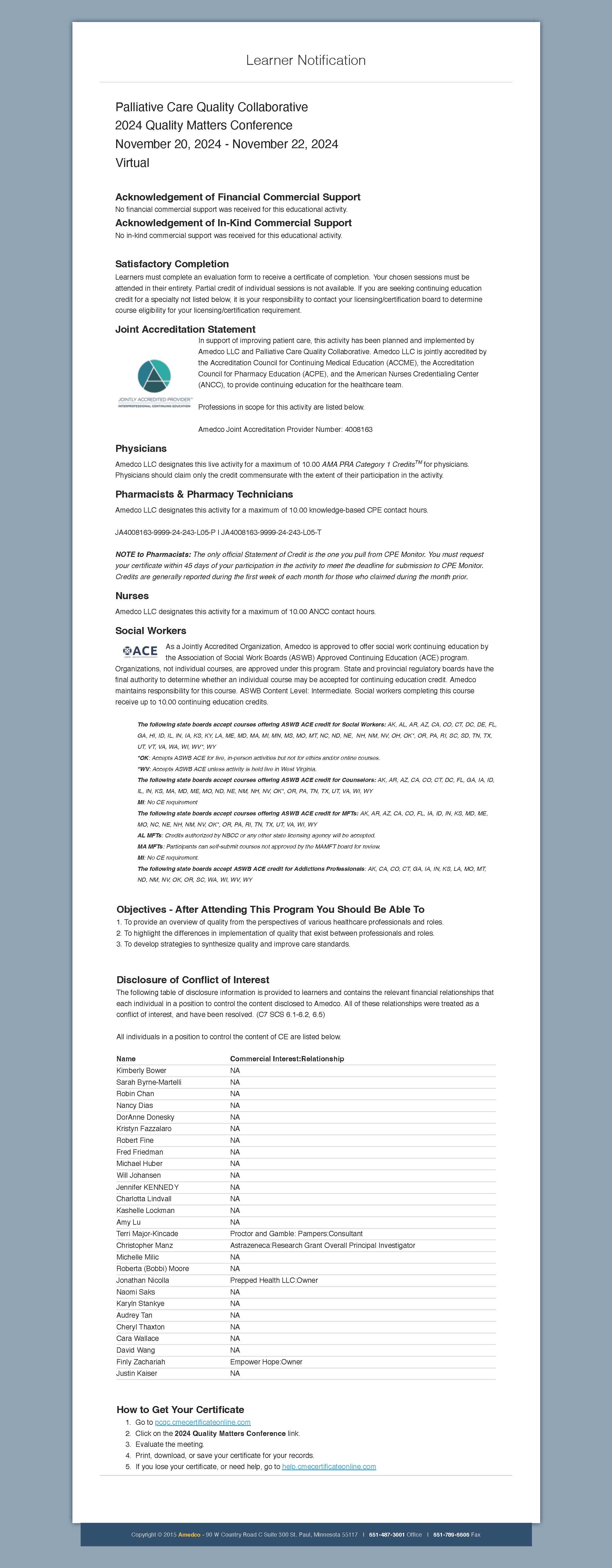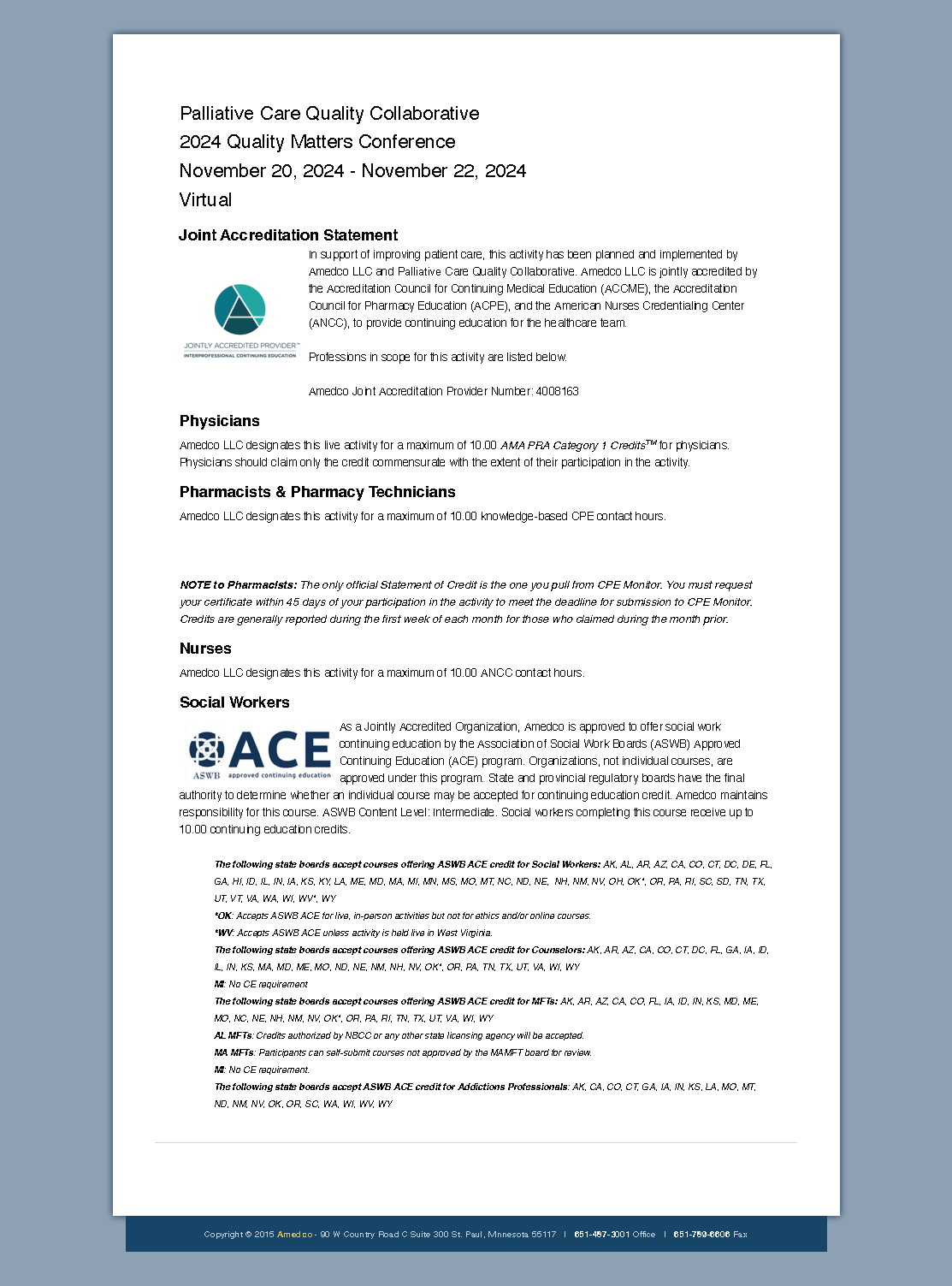 PCQC Virtual Quality Matters Conference 2023
PCQC Virtual Quality Matters Conference 2023
December 14-15, 2023
Continuing Education Details
Joint Accreditation Statement
In support of improving patient care, this activity has been planned and implemented by Amedco LLC and Palliative Care Quality Collaborative. Amedco LLC is jointly accredited by the Accreditation Council for Continuing Medical Education (ACCME), the Accreditation Council for Pharmacy Education (ACPE), and the American Nurses Credentialing Center (ANCC), to provide continuing education for the healthcare team.
Amedco Joint Accreditation #4008163.
Nurses (ANCC) Credit Designation
Amedco LLC designates this activity for a maximum of 7.50 ANCC contact hours.
Physicians (ACCME) Credit Designation
Amedco LLC designates this live activity for a maximum of 7.50 AMA PRA Category 1 CreditsTM. Physicians should claim only the credit commensurate with the extent of their participation in the activity.
Social Workers (ASWB) Credit Designation
As a Jointly Accredited Organization, Amedco is approved to offer social work continuing education by the Association of Social Work Boards (ASWB) Approved Continuing Education (ACE) program. Organizations, not individual courses, are approved under this program. State and provincial regulatory boards have the final authority to determine whether an individual course may be accepted for continuing education credit. Amedco maintains responsibility for this course. ASWB Learner Level: Intermediate. Social Workers completing this course receive 7.50 GENERAL continuing education credits.
The following state boards accept courses offering ASWB ACE credit for Social Workers: AK, AL, AR, AZ, CA, CO, CT, DC, DE, FL, GA, HI, ID, IL, IN, IA, KS, KY, LA, ME, MD, MA, MI, MN, MS, MO, MT, NC, ND, NE, NH, NM, NV, OH, OK*, OR, PA, RI, SC, SD, TN, TX, UT, VT, VA, WA, WI, WV*, WY
*OK: Accepts ASWB ACE for live, in-person activities but not for ethics and/or online courses.
*WV: Accepts ASWB ACE unless activity is held live in West Virginia.
The following state boards accept courses offering ASWB ACE credit for Counselors: AK, AR, AZ, CA, CO, CT, DC, FL, GA, IA, ID, IL, IN, KS, MA, MD, ME, MO, ND, NE, NM, NH, NV, OK*, OR, PA, TN, TX, UT, VA, WI, WY
MI: No CE requirement
The following state boards accept courses offering ASWB ACE credit for MFTs: AK, AR, AZ, CA, CO, FL, IA, ID, IN, KS, MD, ME, MO, NC, NE, NH, NM, NV, OK*, OR, PA, RI, TN, TX, UT, VA, WI, WY
AL MFTs: Credits authorized by NBCC or any other state licensing agency will be accepted.
MA MFTs: Participants can self-submit courses not approved by the MAMFT board for review.
MI: No CE requirement.
The following state boards accept ASWB ACE credit for Addictions Professionals: AK, CA, CO, CT, GA, IA, IN, KS, LA, MO, MT, ND, NM, NV, OK, OR, SC, WA, WI, WV, WY
 PCQC Virtual Quality Matters Conference 2022
PCQC Virtual Quality Matters Conference 2022
December 8-9, 2022
Why Quality Matters: Where You Sit Determines What You See
To understand how to implement quality, we must first understand what quality is. This has many definitions and can mean different things to different people from payment incentives, to program performance, to care standards. To help us synthesize these perspectives, our keynote speaker for first day of QMC 2022, Dr. Tammie Quest, discussed Why Quality Matters and how our perspectives can determine our opinions on quality.Tammie Quest, MD FAAHPM, Director, Emory Palliative Care Center
The State of Our Field
A major component of defining quality is creating measurable bars to ensure standardization. Understanding how we define palliative care teams and structure is important to creating a standard definition for palliative care programs. During this session, our presenters provide an overview of PCQC Programmatic data from 2020-2021 to help us understand the current state and evolution of our field.MaggieRogers, MPH, Director of Research & Analytics, Center to Advance Palliative Care
Fred Friedman, Registry Manager, Palliative Care Quality Collaborative
Managing Opioid Complexity in Individuals with Serious Illness
Quality starts with the work our clinicals do. One of clinical pillars of quality-based palliative care is the management of pain of our patients and the role of opioid prescriptions as an intervention. In this session, our presenters discuss the complexity of opioid prescribing in patients with serious illness. They review the available evidence on chronic pain, long-term opioid therapy, and opioid misuse/use disorders in the general population. Our presenters apply the relevant and emerging evidence in palliative care populations to generate best practices that can inform future quality metrics.
Jessica Merlin, MD PhD MBA, Professor, University of Pittsburgh
Katie Fitzgerald Jones, PhD APN CARN-AP, Postdoctoral Fellow and Nurse Practitioner, Massachusetts General Hospital
Learning from PCQC’s Clinical Quality Data
Understanding clinical quality improvement requires an understanding of standards, measures, and benchmarks. Only by knowing what you need to measure, where you stand in your performance, and how to interpret data to put into action can you see true improvement. In this session, Dr. Steve Pantilat, President of the PCQC Board of Directors, explores PCQC’s clinical, patient-level outcome data, highlighting areas of high performance, as well as how to use these data to improve care.
StevePantilat, MD MHM FACP FAAHPM, Kates-Burnard and Hellman Distinguished Professor in Palliative Care and the Chief of the Division of Palliative Medicine, University of California San Francisco
Patient Reported Outcomes – Benefits and Drawbacks
As our field evolves, we are understanding more about the value of capturing the patient voice in defining and delivering high-quality care. Patient Reported Outcomes (PROs) offer us an avenue to dive deeper into the patient experience, providing us further insight into patient preferences of care. During this panel, our panelists discuss evolution of PROs in patient care and quality measurement.
Panelists
Katherine Ast, MSW LCSW, Director of Quality & Research, American Academy of Hospice and Palliative Medicine Download Slides
Ben Hamlin, DrPH, Senior Research Informaticist, National Committee for Quality Assurance Download Slides
Angela M. Stover, PhD, Assistant Professor of Health Policy and Management, University of North Carolina at Chapel Hill Download Slides
Moderator
Laura Hanson, MD MPH, Professor of Geriatric Medicine and Medical Director, UNC Palliative Care
In partnership with NHPCO, a Panel Discussion: Quality Metrics Across the Continuum of Advance Illness & Support Care
To create uniform standards of care, we must work together to better understands the complexities in defining collecting quality across the serious illness spectrum. During this session, Aparna Gupta, Vice President of Quality at the National Hospice and Palliative Care Organization facilitated a discussion with our panelists to discuss the role of quality and quality measurement across the continuum of advanced illness and supportive care.
Panelists
Kathleen Kerr, Healthcare Consultant and Partner, Transforming Care Partners
Rory Farrand, MS MA MSN, APRN-BC, Vice President, Palliative and Advanced Care, National Hospice and Palliative Care Organization
Joe Rotella, MD MBA HMDC FAAHPM, Chief Medical Officer, American Academy of Hospice and Palliative Medicine
Moderator
Aparna Gupta, DNP FACHE CPHQ, Vice President Quality, National Hospice and Palliative Care Organization
Top 10 Pearls in Palliative Care Quality
Quality improvement provides a framework to strive towards an ideal, providing the best palliative care possible. However, in practice, structured quality improvement is often pushed as a secondary priority with competing clinical and administrative duties, making it difficult to gain momentum towards a culture of quality. Within QI, perfection can often be the enemy of the good and starting with a foundational set of skills can help jumpstart QI work within your program. To help us establish a baseline set of QI principles to build that foundation, Dr. Arif Kamal shared his top 10 pearls of quality improvement for palliative care programs to implement and avoid during our Day Two Keynote.
Arif Kamal, MD MBA MHS FAAHP FASCO, Chief Patient Officer, American Cancer Society and Associate Professor of Medicine and Population Health, Duke University School of Medicine
Policy and Payment Trends Impacting Palliative Care Today and Tomorrow
Quality does not exist in a vacuum and there are other motivations for why we prioritize quality including payment incentives. In this session, our presenter will take us through upcoming policy and payment trends in palliative and hospice medicine and the role of quality in payment. Palliative care delivery and payments models are evolving quickly, as are the policies that affect them. This session provides an overview of key legislative, regulatory and market changes that are impacting palliative care practice today and in the near future.
Phillip Rodgers, MD FAAHPM, Professor, Family Medicine and Internal Medicine and Co-Director, Clinical Palliative Care Program, University of Michigan Medicine
Equity and Quality: An overview of the importance of DEI in quality palliative care
The pursuit of standardized high-quality palliative care requires us to look at more than just quality outcomes and accessibility of care. It also means we must examine the equitability of care provided to patients to ensure all have access to high-quality care. During this session, our presenter discusses the role of equity, inclusion, and diversity in palliative and serious illness care.
Karen Bullock, PHD LCSW APHSW-C, Endowed Professor of Social Work, Boston College
Quality Improvement 101
The primary measure in moving towards a culture of quality is understanding your program’s performance through data. However, once you have data, all you have is data until you know how to turn that into action. The next step in achieving quality-based care is to learn the requisite skills needed to improve upon your performance. During this session, our speaker will demonstrate how palliative care teams can use clinical data to identify and structure quality improvement opportunities.
RachelThienprayoon, MD MSCS FAAP FAAHPM, Associate Professor of Anesthesia and Pediatrics, Cincinnati Children's Hospital
Challenges & Opportunities in Collecting Quality Data
Administering quality-based standards can vary among clinical stakeholders in managing patients across the serious illness spectrum. During this discussion, our panelists share the differences and challenges for interdisciplinary teams and hospice partners in collecting quality data as well as opportunities to grow together.
Panelists
Jori Bogetz, MD, Seattle Children's Hospital and Research Institute
Kristyn Fazzalaro, MSW LWSC APHSW-C, Manager of Palliative Care and Oncology Support Services, Hoag Health System
Allison Kestenbaum, MA MPA BCC-PCHAC ACPE,Supervisor of Spiritual Care & Clinical Pastoral Education, UC San Diego Health
Aparna Gupta, DNP FACHE CPHQ, Vice President Quality, National Hospice and Palliative Care Organization
Moderator
Phillip Rodgers, MD FAAHPM, Professor of Family Medicine and Internal Medicine Director, Adult Palliative Care Clinical Services
PCQC Virtual Quality Matters Conference 2022
December 8-9, 2022
Thank you to everyone that made the the Palliative Care Quality Collaborativeinaugural Quality Matters Conference a success including our participants, speakers, and sponsors! During this event, we were able to promote best practices and training for providing the highest quality palliative care to patients with serious illness and their loved ones.
Quality Matters Conference 2022 was a two-day virtual event that will bring together thought leaders within palliative care to share best practices, opportunities, and innovations that support high-quality care. The Quality Matters Conference welcomed all members of the palliative care field regardless of experience in quality, offering actionable insight to promote a culture of quality within their palliative care programs. We are delighted to be able to provide up to 8 hours of continuing education credits through this activity. For more information, pelase read the Continuing Education Details page.

Sponsorship opportunities are available for this virtual conference. Please contact the PCQC Team to learn more.



